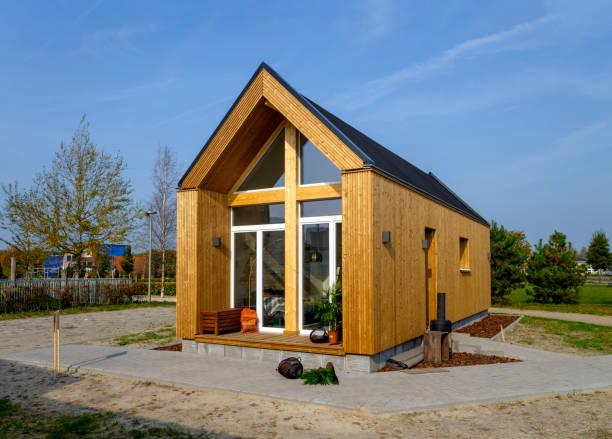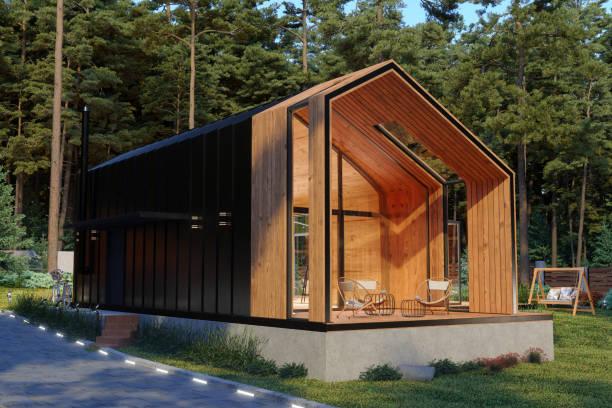Grab that third cup, friend. We need to talk logistics. The dream of that little cabin in the Rockies is great, but getting it built? That’s where the real decisions happen.
So, you’ve decided Colorado is the spot—smart move, with the state finally getting friendly about tiny house code. But now you have to choose your adventure: Do you go the bespoke, build-it-from-scratch route? Or do you pick a gorgeous model from a catalog and say, "Ship it!"?
Here’s my totally unscientific, over-coffee take on comparing custom tiny home builders in Colorado with their prefab counterparts.
Team Prefab: Speed, Sanity, and Sticker Price
Let’s start with prefab, which is short for "prefabricated." Think of it as the IKEA of tiny homes, but, you know, much higher quality and less confusing assembly.
The Upsides:
-
Speed (The Flash Factor): This is the number one reason people choose prefab. Instead of waiting a year for custom design, permitting, and on-site construction delays (hello, Colorado winter!), a prefab unit is often built indoors in a controlled factory environment. While your land is getting prepped, your house is being built. Some great tiny home builders Colorado has can have a model ready in 4-6 months, sometimes even faster for in-stock units!
-
Price Predictability: Prefab models come with a clear price tag. You know exactly what you’re paying for the shell, the finishes, and the appliances. This is an enormous relief, because in construction, budget creep is basically inevitable. With prefab, the risk of getting surprised by a $15,000 cost overrun is significantly lower. These units often range from $50,000 to $150,000, which is manageable for a lot of people.

-
Code Compliance (Built-In Sanity): Here’s the subtle genius: many Colorado prefab builders specialize in building homes that meet state certifications, like the Division of Housing (DOH) requirements, or specific local standards. They handle the headache of making sure the roof snow load and wind resistance meet those crazy Colorado specifications before the house even leaves the factory. This can save you weeks of agony trying to satisfy the local building department.
The Downside (The "But I Wanted a Secret Library!"):
The drawback is obvious: customization is limited. You might be able to pick the color of the cabinets and the floor laminate, but getting that spiral staircase with built-in wine storage? Probably not. You’re choosing from a menu, not creating the recipe. If your needs are highly specific—say, you need a photography darkroom or an accessible, single-level design that defies the standard loft plan—prefab might feel too restrictive.
Team Custom: Imagination, Detail, and Dollars
Now for the bespoke route. This is where you hire an architect and a local tiny home builders Colorado team (like those focused on ADUs or ground-up construction in places like Durango or Denver). You get to dream big, or rather, dream small with incredible precision.
The Upsides:
-
The Perfect Fit (It’s ALL You): Every inch is optimized for your life. Your weird-shaped plot of land? The custom builder can design a house that fits perfectly within the setbacks. Your collection of antique globes? They'll design a niche for that. You can choose high-end, sustainable, or local materials that a prefab factory might never use. It's truly a forever home, tailored to your every quirk.
-
Built to the Letter (The Code Master): Since the home is built on-site or designed for a permanent foundation from day one, it’s easier to ensure it meets the local tiny house code for a true, certified dwelling (not just an RV). This is crucial if you want to finance the home with a traditional mortgage, get it properly appraised, and ensure it counts as an asset on your property.
-
Higher Quality & Resale Value: Generally, custom homes on a permanent foundation use more robust materials and boast superior craftsmanship compared to many basic prefab kits. While tiny homes aren't guaranteed to appreciate like a big house, a well-built, permitted, custom tiny home on a foundation in a desirable Colorado location tends to hold its value better and is easier to resell to a traditional home buyer.
The Downside (The "When Will It Be Done?!" Factor):
Custom takes time and money. There’s no getting around it. You’ll spend months in the design phase, more time getting permits, and the construction timeline is at the mercy of the weather (and supply chain hiccups—ugh, we’ve all been there). The cost? Expect to pay significantly more—often 20% to 50% higher than a comparable prefab model—because you're paying for personalized design, architectural drawings, and premium on-site labor.
⚖️ My Quick-and-Dirty Takeaway
So, what should you choose?
| If you prioritize... | Then you should probably go... | Because... |
| Speed & Budget | Prefab/Modular | Quick build, known costs, less permitting headache. You get a great home, fast. |
| Total Customization & Long-Term Investment | Custom-Built | Every inch is tailored to your life, built to last, and it adheres perfectly to local residential code, which is better for mortgages and resale. |
Honestly, you can't go wrong either way in Colorado right now. The infrastructure and the builder community are there to support the tiny life. The real choice comes down to how much control you need and how quickly you want to wake up to that mountain view.
Which builder’s website are you checking out first—the quick-ship models or the custom

Join our community to interact with posts!